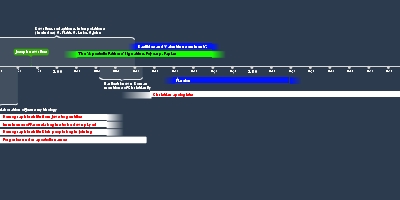Expanding messianic memes in Judaism (1 gen 125 anni a. C. – 31 dic 25 anni)
Descrizione:
In the century or so prior to the life of Jesus, the messianic ideology within Judaism evolved, branching out in directions that would prove to be directly relevant to the emergent phenomenon of Christianity. This can be tracked in part by new usages of the root Hebrew term for “anointed one”. From a summary on the Academic Bible subreddit:---
The term Christ (χριστός) is simply the Greek equivalent of Hebrew משיח "anointed one", which later came to have a messianic use (which arose in the Second Temple period following the failure of the Davidic monarchy to return). The Septuagint generally used it in a non-messianic sense in royal or priestly contexts, such as Isaiah 45:1 LXX referring to Cyrus as God's anointed one (τῷ χριστῷ μου Κύρῳ), which transfers the Davidic throne to the Achaemenids (see Lisbeth S. Fried's article in HTR, 2002). Sacerdotal examples of χριστός (referring to the high priest of the Temple) can be found in Daniel 9 in the revisions of the OG, such as "seven weeks ... until an anointed leader (ἕως χριστοῦ ἡγουμένου)" in Theodotion (Daniel 9:25) and "an anointed one will be cut out (ἐκκοπήσεται χριστὸς)" in Symmachus (Daniel 9:26).
Messianic usage of משיח first appears afaik at Qumran in the late second century BCE, in references to the "messiah of Israel" or "the messiah of Aaron" (CD-B 19:10, 1QS 9:10-11, 1QSa 2:14-15). A later messianic text from the first century BCE urges believers to wait "until the Messiah of Righteousness comes, the branch of David. For to him and to his descendants has been given the covenant of the kingship of his people for everlasting generations" (4Q253 5:3-4).
Around the same time were written the Psalms of Solomon, which present one of the first known messianic uses of χριστός in Greek. Psalms of Solomon 17:21, 32, 18:5-7: "Raise up for them their king, the son of David, to rule over your servant in the time known to you, O God...And he will be a righteous king over them, taught by God. There will be no unrighteousness among them in his days, for all shall be holy, and their king shall be the Lord Messiah (καὶ βασιλεὺς αὐτῶν χριστὸς κὐριος)... May God cleanse Israel for the day of mercy in blessing, for the appointed day when his Messiah will reign (εἰς ἡμέραν ἐκλογῆς ἐν ἀνάξει χριστοῦ αὐτοῦ). Blessed are those born in those days, to see the good things of the Lord which he will do for the coming generation (which will be) under the rod of discipline of the Lord Messiah (ὑπὸ ῥάβδον παιδείας χριστοῦ κυρίου)".
The other important pre-Christian work that has a messianic use of "Christ" is the Book of Parables (late first century BCE or early first century CE), which pictures the messiah as the Son of Man enthroned in heaven as the Chosen One. This messianic concept is far beyond Davidic ideology and rather pictures the messiah as an eschatological agent appointed by God to judge the world. The extant text is in Ethiopic but it has underlying Greek and possibly Aramaic vorlage. "In those days, the Elect One shall sit on my throne, and from the conscience of his mouth shall come out all the secrets of wisdom, for the Lord of the Spirits has given them to him and glorified him...All these things which you have seen happen by the authority of his Messiah (ἐν ἐξουσίᾳ τοῦ χριστοῦ αὐτοῦ ἔσονται in Matthew Black's retroversion) so that he may give orders and be praised upon the earth" (1 Enoch 51:3, 52:4).
---
All of these elevated uses of the messianic concept are immediately familiar to anyone acquainted with Christian lore, but to know that they predate Jesus himself should provoke a shift of perspective. After Jesus’ death, his followers did not “invent” or realize an entirely new form of messiah. They instead appear to have grafted their fallen leader onto grandiose messianic memes that had already been in use for some time. As early as Paul, an association between Jesus and the eschatological Son of Man appears in the record. The truly unique elements of Jesus’ messiahship – the concept of a suffering servant, atonement theology – were outgrowths of an attempt by his followers to explain (surely as much to themselves as to others) why, if Jesus was a messiah of any stripe, he’d suffered such a seemingly lowly fate.
Aggiunto al nastro di tempo:
Data:
1 gen 125 anni a. C.
31 dic 25 anni
~ 151 years
